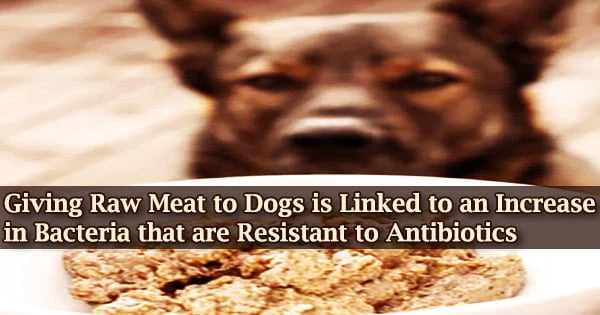Recent studies have linked germs that are resistant to critically needed antibiotics to the feeding of raw meat to dogs as pets.
Dogs fed a diet high in raw meat were found to be more likely to excrete the antibiotic-resistant bacteria Escherichia coli (E. coli) in their feces, according to two studies conducted by a team at the University of Bristol.
Antibiotic-resistant bacteria can develop and spread in both humans and animals when antibiotics are misused or overused. These may lead to infections that are incurable. Antibiotic-resistant bacteria present in the guts of animals can get in food in several ways:
During the killing and processing of animals for sustenance, meat or other animal products may become contaminated by resistant bacteria.
Poop from animals may contain bacteria that are resistant to treatment and enter the environment.
Intestinal bacteria are present in all animals. Antibiotics are administered to animals bred for food to treat infections and kill certain microorganisms. However, some bacteria are immune to antibiotics, and these bacteria frequently persist and proliferate.
The researchers suggest that raw feeding is not the safest dietary option and that, if chosen, owners should take extra precautions when handling raw meat and be especially careful to clean up after their dog. Previous research has shown that there is the potential for bacteria to be shared between dogs and their human owners through routine interaction.
Antibiotic-resistant bacteria are everywhere, but some antibiotics are considered critically important for use in humans. We have shown that dogs fed raw meat are more likely to carry bacteria resistant to these important medicines. This doesn’t mean that the animal, or the owner, will become sick.
Professor Matthew Avison
According to a study published today (July 21, 2022) in the Journal of Antimicrobial Chemotherapy, mature canines who consumed raw meat had higher levels of resistant E. coli in their excretions.
The study backs up a recent investigation by the researchers, which looked at 16-week-old puppies and was published in the journal One Health. Both studies, which analyzed information from several dogs, show that dogs may excrete resistant germs regardless of their age or how long they had been fed a diet high in raw meat.
Antibiotic-resistant bacterial infections can cause minor diseases. Sometimes they can result in severe illnesses that are fatal or require a long time to recover from.
The likelihood that a dog may excrete resistant germs was also influenced by the environment in which it lives. For dogs living in the country, raw feeding was a significant risk factor, whereas risk variables for dogs living in cities were significantly more complex, perhaps due to the variety of lifestyles and exposures that city dogs experience.
Totaling 823 dogs and their owners for the two studies (223 puppies for the first study and 600 adult dogs in the second study). Dog owners filled out questionnaires on their dogs’ food, environments, and lifestyles as well as providing samples of their dogs’ feces.
The samples were then examined for the presence of E. coli that was resistant to antibiotics, and risk factor studies were carried out to investigate the links between environmental factors, lifestyle factors, and the detection of resistant E. coli.
Matthew Avison, Professor of Molecular Bacteriology from the School of Cellular and Molecular Medicine, who led the microbiology aspects of these studies, said:
“Antibiotic-resistant bacteria are everywhere, but some antibiotics are considered critically important for use in humans. We have shown that dogs fed raw meat are more likely to carry bacteria resistant to these important medicines. This doesn’t mean that the animal, or the owner, will become sick.”
“E. coli is a widespread bacterium that is found in the intestines of all humans and animals, however, it is a common cause of many diseases including urinary tract infection and can cause serious illness including sepsis if it spreads to other parts of the body.”
“We should do everything we can to reduce the circulation of critically important antibiotic-resistant E. coli and other bacteria. Our research adds to the increasing evidence that not feeding raw meat to dogs may help in that objective.”
“We know humans and animals share bacteria with one another, so what we find in your pet may well also be in you. Pet owners should be encouraged to practice good hygiene and not feeding raw food to your dog can be part of this,” added Kristen Reyher, Professor of Veterinary Epidemiology and Population Health at the Bristol Veterinary School and co-author on both papers. “We can all do our part to decrease antibiotic resistance and its terrible effects on both human and animal health.”
















